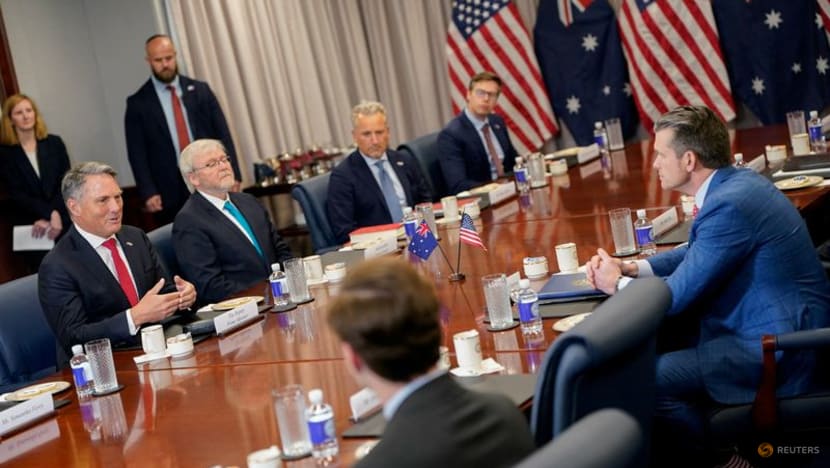Australia confident US will proceed with Biden-era submarine pact after review

US Defense Secretary Pete Hegseth meets with Australian Defence Minister and Deputy Prime Minister Richard Marles at the Pentagon in Washington, on Feb 7, 2025. (Photo: REUTERS/Nathan Howard)
SYDNEY: Australia's Defence Minister Richard Marles said on Thursday (Jun 12) he was confident the AUKUS submarine pact with the US and Britain would proceed, and his government would work closely with the US while the Trump administration conducted a formal review.
In an Australian Broadcasting Corporation radio interview, Marles said AUKUS was in the strategic interests of all three countries and the new review of the deal signed in 2021 when Joe Biden was the US president was not a surprise.
"I am very confident this is going to happen," he said of AUKUS, which would give Australia nuclear-powered submarines.
"This is a multi-decade plan. There will be governments that come and go and I think whenever we see a new government, a review of this kind is going to be something which will be undertaken," Marles told the ABC.
Australia in 2023 committed to spend A$368 billion (US$239.3 billion) over three decades on AUKUS, Australia's biggest ever defence project with the United States and Britain, to acquire and build nuclear-powered submarines.
Australia's Prime Minister Anthony Albanese is expected to meet US President Donald Trump for the first time next week on the sidelines of the G7 meeting in Canada, where the security allies will discuss tariffs and a request from the United States for Australia to increase defence spending from 2 per cent to 3.5 per cent of gross domestic product.
Albanese had previously said defence spending would rise to 2.3 per cent and has declined to commit to the US target, saying Australia would focus on capability needs.
Under AUKUS, Australia was scheduled to make a US$2 billion payment in 2025 to the US to help boost its submarine shipyards and speed up lagging production rates of Virginia-class submarines to allow the sale of up to three US submarines to Australia from 2032.
The first US$500 million payment was made when Marles met with his US counterpart Pete Hegseth in February.
US NOT MEETING PRODUCTION TARGETS
The Pentagon's top policy advisor Elbridge Colby, who has previously expressed concern the US would lose submarines to Australia at a critical time for military deterrence against China, will be a key figure in the review, examining the production rate of Virginia-class submarines, Marles said.
"It is important that those production and sustainment rates are improved," he added.
AUKUS would grow the US and Australian defence industries and generate thousands of manufacturing jobs, Marles said in a statement.
John Lee, an Australian Indo-Pacific expert at Washington’s conservative Hudson Institute think tank, said the Pentagon review was "primarily an audit of American capability" and whether it can afford to sell up to five nuclear powered submarines when it was not meeting its own production targets.
"Relatedly, the low Australian defence spending and ambiguity as to how it might contribute to a Taiwan contingency is also a factor," Lee said.
Charles Edel, Australia chair at the Center for Strategic and International Studies in Washington, said AUKUS was significant for "enhancing deterrence by putting more players in the field", and it would be important for Albanese to seek reassurance from Trump when they meet.
"A necessary part of the conversation will be discussing how both Australia and the US are working to boost their own defence capabilities, enhancing allied integration, and delivering deterrent effects with a sense of urgency," he said.
On the potential implications of a US withdrawal or even a renegotiation of the alliance, Emma Shortis, director of the international and security affairs programme at the Australia Institute, a public policy think tank, said: "It was always likely that Australia would never get these submarines anyway.
"So in that sense, that hasn't necessarily changed the circumstances, and I think really what this does is offer Australia an opportunity to rethink our security and the nature of our relationship with the US," she noted.
Shortis told CNA's Asia Now that the Trump administration has made its views on traditional allies abundantly clear.
She stressed that the submarines "were never about the protection of the Australian mainland".
"They're designed to go very far from Australian shores," she added.
"So, in terms of benefit, AUKUS was never really a benefit to Australian security or to the region, which was pretty concerned about the deal as well."
Under the multi-stage AUKUS timeline, Britain and Australia will jointly build a new AUKUS-class submarine expected to come into service from 2040.
Marles said Britain's recently completed review of AUKUS was positive. Britain announced plans this month to increase the size of its nuclear-powered attack submarine fleet.













